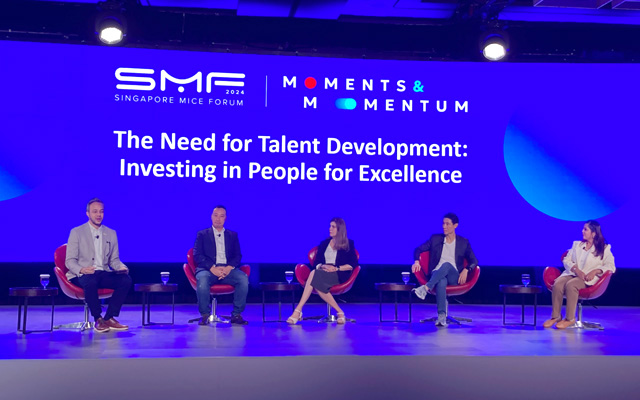
Talent development advocates at last week’s Singapore MICE Forum (SMF) urged the events industry to pay it forward, audit hiring processes, and change mindsets in the war to attract staff and retain them.
They also called for the need to coach and mentor, embrace reverse mentoring, update outdated HR practices and employ journey mapping in the hiring process, during The Need for Talent Development: Investing in People for Excellence panel session.

According to Nisha Abu Bakar, co-founder World WomenTourism and founder of Elevated Consultancy and Training, mentors can help mentees expand their networks, build relationships, and gain access to valuable resources and opportunities. Mentors can also help mentees explore their growth prospects, and set meaningful goals for their professional development.
Reverse mentoring, she explained, is leadership adopting the “culture of learning and adaptability… the growth mindset among the young”, which only 12 per cent of businesses have a formal process for.
During her presentation prior to the panel discussion, Abu Bakar relayed examples of how companies such as Deloitte and the Human Capital Institute have resulted in higher employee satisfaction and loyalty; higher employee engagement and retention rates; development of future leaders; enhanced productivity and revenue growth; and promotion and progression.
In response to panel moderator and SMF chair Ian Wu’s call to pay it forward when acquiring talent, Neeta Lachmandas, founder, ConsciousService, pointed out that the events industry is interesting and exciting because it involves creation and innovation – concepts that appeal to the young – and should be played up.
Frank Koo, founder and director, Nexplay, commented that beyond credentials, the events industry should attract those who are agile, flexible, and have transferable technical skills.
For today’s talents that value DEI (diversity, equity and inclusion) and realise the economic impact of the events industry, an organisation that is purpose-driven may also find it easier to attract and hire, Edward Chew, director, service development, employment, SG Enable, a Singapore agency dedicated to enabling persons with disabilities, pointed out.
Lachmandas noted SMEs, which make up the majority of companies in the events ecosystem, need to understand the importance of journey mapping – a visualisation document that showcases the steps in trying to accomplish a goal – for hiring. Executives involved in hiring also need to make a good first impression in communicating the company’s brand and vision, and follow through with onboarding.
She added that if employers give employees who want to grow new opportunities, even if they leave after two or three years, it is still “not a bad equation” in terms of their contribution.
The events industry, she observed, should position the roles to be filled by appealing to talent who are keen on problem-solving, “self aware and understand their strengths and weaknesses”, can manage their emotions and like “systematic thinking interdependency”.




















